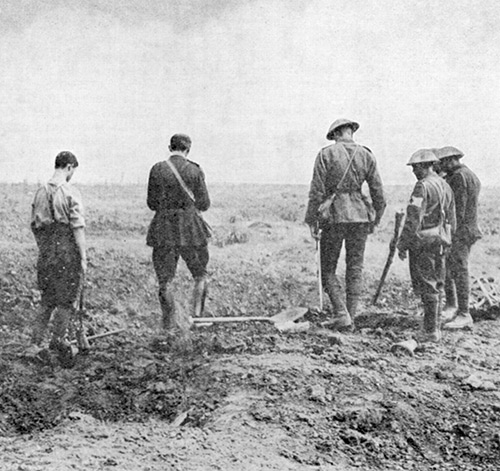I've always wondered what he would have been capable of if he hadn't died in the line of duty at the age of 25. Here's a harrowing excerpt from one of Owens' anti-war poems, the final stanza of "Dolce Et Decorum Est":
If in some smothering dreams, you too could pace
Behind the wagon we flung him in,
And watch the white eyes writhing in his face,
His hanging face, like a devil's sack of sin;
If you could hear, at every jolt, the blood
Come gurgling from the froth-corrupted lungs,
Obscene as cancer, bitter as the cud
Of vile, incurable sores on innocent tongues -
My friend, you would not tell with such high zest
To children ardent for some desperate glory,
The old Lie: Dulce et decorum est
Pro patria mori.
Here's the whole thing.
~ Citation for the award of the Military Cross to Wilfred Owen, 30 July 1919
Behind the wagon we flung him in,
And watch the white eyes writhing in his face,
His hanging face, like a devil's sack of sin;
If you could hear, at every jolt, the blood
Come gurgling from the froth-corrupted lungs,
Obscene as cancer, bitter as the cud
Of vile, incurable sores on innocent tongues -
My friend, you would not tell with such high zest
To children ardent for some desperate glory,
The old Lie: Dulce et decorum est
Pro patria mori.
Here's the whole thing.
For conspicuous gallantry and devotion to duty in the attack on the Fonsomme Line on October 1st/2nd, 1918. On the company commander becoming a casualty, he assumed command and showed fine leadership and resisted a heavy counter-attack. He personally manipulated a captured enemy machine gun from an isolated position and inflicted considerable losses on the enemy. Throughout he behaved most gallantly.
~ Citation for the award of the Military Cross to Wilfred Owen, 30 July 1919
Dulce et decorum est pro patria mori is a line from the Roman poet Horace's Odes (III.2.13). The line can be roughly translated into English as "It is sweet and fitting to die for your country." Kenneth Branagh reads the poem here:
March 18 is the anniversary of the birth of English "war poet" Wilfred (Edward Salter) Owen (1893-1918) (wiki) (online archive) (BBC History), whose verse forms much of the text of the celebrated War Requiem (wiki) of Benjamin Britten*. Born in Oswestry and raised in Shrewsbury, Owen became the "lay assistant" to a vicar in nearby Dunsden in 1911 and later tutored English in France.
After the outbreak of World War I, he returned to England to enlist and eventually served on the Somme. Severely "shell-shocked," he was invalided home in May 1917 then returned to active duty in France in August 1918. Owen was awarded the Military Cross posthumously for gallantry in an action two months later, but he was killed, at the age of 25, by German machine-gun fire while leading an attack on the Sambre-Oise canal just a week before the Armistice in November 1918.
A BBC production on Owen's life entitled Wilfred Owen: A Remembrance Tale:
Here's a live television broadcast of Benjamin Britten conducting his own War Requiem in 1964:
Parts of the text above is adapted from Ed's Quotation of the Day, only available via email - leave your email address in the comments if you'd like to be added to his list. Ed is the author of Hunters and Killers: Volume 1: Anti-Submarine Warfare from 1776 to 1943 and Hunters and Killers: Volume 2: Anti-Submarine Warfare from 1943.
.jpg%2F235px-Wilfred_Owen_plate_from_Poems_(1920).jpg&container=blogger&gadget=a&rewriteMime=image%2F*)

No comments:
Post a Comment